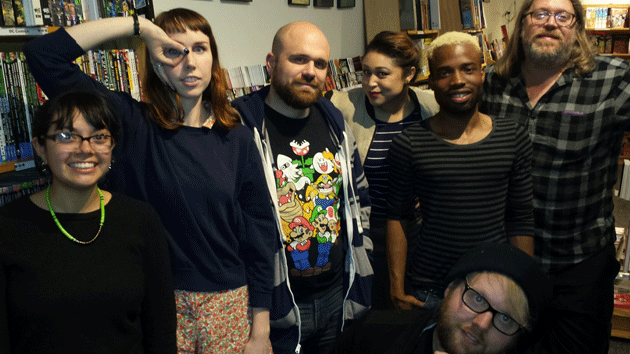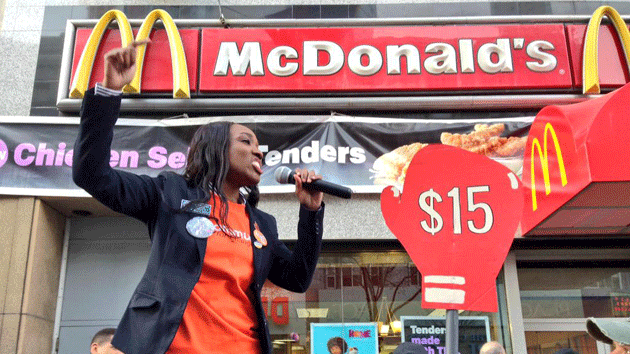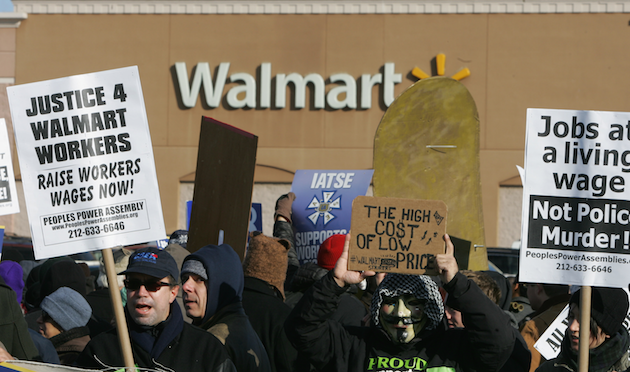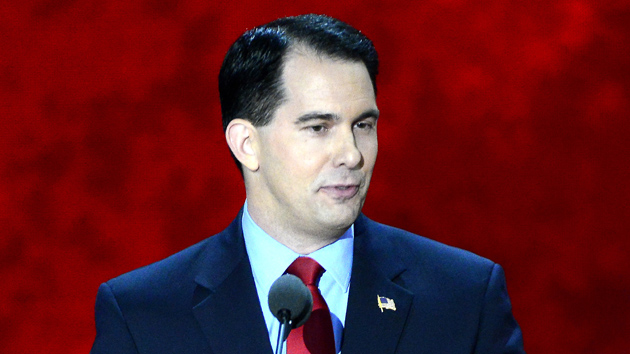
Brian Hibbs (far right) and his employees, some of whom may lose shifts or even their jobs, if San Francisco's minimum wage goes to $15.<a href="http://www.comixexperience.com/staff.html">ComixExperience.com</a>
Brian Hibbs, a Mother Jones reader and owner of Comix Experience, wrote in to object to San Francisco’s plan to raise its minimum wage. Conservatives who argue against the minimum wage often point to jobs lost and heavy burdens on small businesses, and progressives largely brush off those arguments as so much Chamber of Commerce propaganda. And then you have guys like Hibbs. Read what he has to say, and then we’ll discuss.
I own two comic book stores in SF, and while we’re a profitable business and have been for 26 years, we’re only modestly profitable, y’know? When you calculate my own salary on a per-hour basis, given that 70-hour weeks are not at all uncommon for me, I don’t make much more than the high-end of SF’s new minimum wage law.
Raising the minimum wage by 43 percent (from $11.05 today to $15 in 2018) means that we need to generate at least another 80 grand in revenue. Eighty grand. I don’t personally make eighty grand in a year. I’m not some kind of fat cat getting rich off the exploitation of my workers or something. And look, if I did manage to increase sales by that amount, I’d sure be hoping that I got to keep a tiny little percentage of it myself.
Just so we’re clear: The hole I find myself soon facing isn’t one created by escalating San Francisco rents (my landlord is awesome!), or because of competition from the internet (in fact, our sales consistently grow year-over-year, and sales growth has accelerated since the introduction of digital comics), but one solely and entirely created by the increase of the minimum wage.
I’m a progressive; I support fair labor practices, and I try, above all else, to give the folks who work for me absolute agency in their jobs. I have multiple employees who quit higher paying jobs for corporate owners to come work for me, because I actively valued their passions. I don’t own a comic book store to make money as my primary goal, right? The primary goal is to wake up the morning and be excited by what you do, to feel like you’re spreading your passion, that you’re promoting art, and creators and joy—and my staff feels much the same way.
I have staff who are supported by a spouse and are working for me to essentially make pocket money; I have staff who want to be full-time artists, and this helps them get closer to their goal by exposing them to the form and helping them make contacts. I have staff who are actively working toward having their own stores, and I’m basically paying them to get a master’s class (though I am fine with that!). I have staff who are full-time students living at home.
I’m not exploiting any of them, I don’t think. They all have options, and they all work for me because they want to.
If I can’t increase sales by $80,000—which is not something that seems likely, given historical year-over-year gains—then I have to start firing people, or trimming hours of operation. We don’t run extravagant overlaps—nearly 60 percent of the hours the stores are open we only have one person on deck; nor do we have a lot of waste or absurd inventory or anything like that. I’ve survived in a kind of marginal business for 26 years by being a savvy businessperson, and a relatively nimble and predictive one. But firing people, cutting hours…how does that help the employees? How does that help the business expand so I can eventually hire more people?
I have the largest staff of any SF comics business (because I have two locations), and, in point of fact, my two closest competitors have zero employees. Not being impacted by this mandate, they’d have no reason to raise prices in tandem…and really, every reason to not do so. If I raised prices by, let’s say, 10 percent to meet this mandate, I’m absolutely positive we’d lose at least 20 percent of our business to stores that didn’t raise their prices—thereby putting us at a net negative.
We’re trying to solve this problem by growing our way out of it with a new national, curated Graphic-Novel-of-the-Month Club, but I think that if we’re able to succeed from that (and I am not at all sure we will) it will be because of years of building our exceptional reputation. As a result, I do not at all think that this type of solution is scalable for the average small business. The City of San Francisco’s own Office of Economic Analysis believes the minimum wage hike will cost 15,270 jobs, or 2 percent of the private workforce!
Honestly, if San Francisco had voted for “Minimum Wage must be at least equal to X percent of your net profit” or “Every person in America gets a guaranteed income of $20,000/year paid for by progressive taxes” or some other scheme where you know that people being asked to contribute more can afford it, then maybe we’d be on sounder ideological ground…But I think that the higher minimum wage, the higher you’re making the barriers for low-income people and marginal-but-promising businesses to even have a chance to enter the marketplace and to survive in the first place, let alone legacy businesses like ours.
Here’s my personal take: It’s hard not to feel sympathy for Hibbs, yet it would be a mistake to take his situation as a case for abolishing or making exceptions to the city’s minimum wage law. As I’ve noted elsewhere, raising the minimum wage doesn’t tend to decrease overall employment; in general, businesses find new efficiencies and their workers find themselves with more disposable income to spend on things like comics.
Of course, that’s probably little comfort to Hibbs, who faces competition from smaller comics stores whose sole proprietors are the ones manning the cash registers. Hibbs may well be able to keep his doors open by downsizing, bringing in volunteers, or drumming up donations from devoted customers (as one local bookstore has done), but when it comes down to it, there simply may not be much of a future for bricks-and-mortar comics stores in a city with astronomical real estate prices.
“I super commiserate with him because we are in almost the identical situation,” says Lew Prince, a member of the group Business for a Fair Minimum Wage and the owner of Vintage Vinyl, a record store in St. Louis. Dwindling sales and rising labor costs forced Prince to consolidate his two Vintage Vinyl locations into one. He nonetheless supports increasing Missouri’s minimum wage from $7.65 to $12 an hour because he thinks it’s the right thing to do. “The job of the business owner is to prepare for the future,” he told me. “I have great empathy and sympathy for [Hibbs], but you have to do the job every day, and sometimes the marketplace defeats you.”
But maybe that point of view is too harsh. I’d love to hear, in the comments, what Kevin’s readers think about all of this.

















